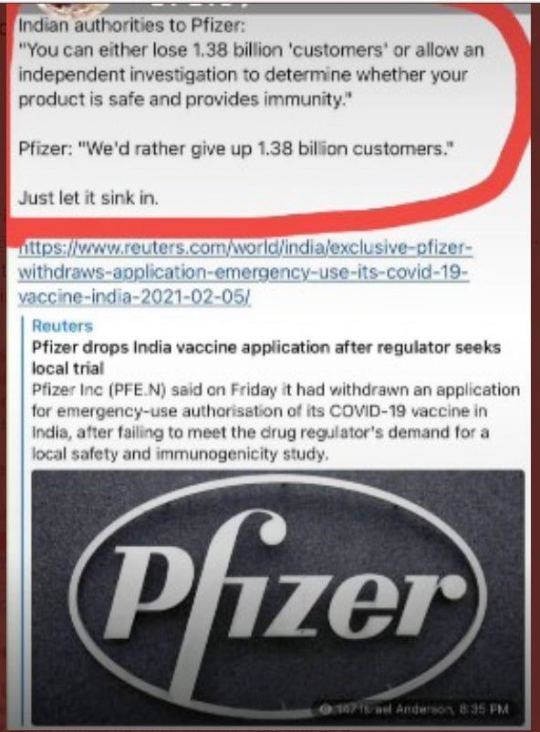#covid vaccine india
Explore tagged Tumblr posts
Text
India was able to save more than 3.4 million lives by undertaking a nationwide Covid-19 vaccination campaign at an unprecedented scale, according to a Stanford University report.
The campaign also yielded a positive economic impact by preventing a loss of $18.3 billion, the working paper by Stanford University and Institute for Competitiveness titled 'Healing the Economy: Estimating the Economic Impact on India's Vaccination and Related Issues' released by Union health minister Mansukh Mandaviya on Friday suggested.
According to the Stanford report, the direct and total impact of vaccination varied from about $ 1.03 billion to $ 2.58 billion if minimum wages are considered within the age distribution category.
“The same, however, varied from about $3.49 billion to $ 8.7 billion if GDP per person employed (constant) is considered. The cumulative lifetime earnings of the lives saved through vaccination (in the working age group) rolled up to $ 21.5 billion. Moreover, since vaccination also saved the lives of the elderly, this indirectly helped prevent the health infrastructure from getting overwhelmed and thereby allowing for a more judicious use of the existing health infrastructure,” the report suggested.
Mandaviya said much before Covid-19 was declared a public health emergency by the World Health Organisation (WHO) in January 2020, processes and structures to focus dedicatedly on various facets of the pandemic management were put in place...
The Stanford working paper refers to a Lancet modelling study which estimated that in India around 3.4 million deaths were prevented by vaccination in the year 2021, an estimate based on officially reported deaths in India.
The paper also highlighted the impact of the lockdown and referred to the health ministry’s statistical analysis that the Covid-19 tally could have reached about two lakh (0.2 million) without lockdown by April 11, 2020.
Due to lockdown measures, the actual cases only went up to about 7,500 by April 11, 2020, making a case for the lockdown stronger."
-via Times of India, 2/25/23
#india#covid#covid 19#vaccination#pandemic#covid relief#science and technology#public health#lockdown#good news#hope
43 notes
·
View notes
Text
22 notes
·
View notes
Text
India: An overview of the saga of the Journey
Share what you know about the year you were born. The dust was settling, but a few plumes still reared their devilish head. Communal conflagrations occasionally erupted to cause wide-scale disruption in public order and gravely threaten the law of the land. Migration to the newly created nation on the West and East sides of the vivisected and bleeding India was continuing. Persecution and…
#Covid-19#dailyprompt#dailyprompt-2161#Free India#Freedom#History#journey of India during the past seventy and five years#Vaccination
0 notes
Text
India's COVID-19 Vaccination Success: A Global Leader
India’s COVID-19 vaccination journey is a testament to resilience and innovation, propelling it to the forefront of global healthcare. With over 2.2 billion doses administered as of 2024, India’s campaign stands among the largest and most complex vaccination efforts worldwide. Significant progress has been made. However, the road to achieving full immunization has been riddled with challenges.…
#coronavirus updates#Covaxin vs Covishield#COVID precautions#COVID-19#global pandemic#health and safety#immunization#India COVID news#medical research#mutant strains#pandemic insights#pandemic statistics#post-pandemic recovery#public awareness#public health#second wave#vaccination drive#vaccine effectiveness#vaccine hesitancy#vaccine rollout challenges
0 notes
Text
India reported 908 new Covid cases, 2 deaths between June and July: WHO

India has witnessed 908 new Covid-19 cases, and two deaths between June and July this year, according to a World Health Organization (WHO) report on Wednesday.
The latest Covid epidemiological update by the UN body showed that between June 24 to July 21, an average of 17,358 specimens were tested for SARS-CoV-2 every week across 85 countries.
Source: bhaskarlive.in
0 notes
Text
youtube
Sofa cum bed designed by dhruv interiors specially for my new client very relaxes and with food comfort and look
#SofaCumBed ConvertibleFurniture SpaceSavingFurniture furniture FurnitureDesignHomeDecordesign#home interior#interior decorating#vogue india#vogue#vogue magazine#interior design#interiors#interiorismo#factoryinteriors factory factorylife production productionline factoryfloor industrial industria industrialdesign manufacturing#boris johnson ‘ordered spies to plan raid on dutch covid vaccine factory’ after eu threat to seize millions of doses’#living roon furniture#living room#Youtube
1 note
·
View note
Link
“Global Influenza Vaccines Market and Forecasts 2024 – 2032” presents an in-depth assessment of the global influenza vaccines market dynamics, opportunities, future road map, competitive landscape and discusses major trends. The report offers the most up-to-date industry data on the actual market situation and future outlook in the global influenza vaccines market. The report also provides up-to-date historical market size data for the period 2018 – 2023 and an illustrative forecast to 2032 covering key market aspects like market value, volume analysis, and trends for influenza vaccines globally.
1 note
·
View note
Text
A new web app for the COVID-19 immune antibody helps in vaccine scheduling

- By InnoNurse Staff -
With SARS-COV-2 infection rates on the rise once more, you might be wondering if you should receive a COVID-19 vaccination booster shot. Yale physicians have created a tool to assist in answering these questions.
Read more at Yale University
///
Other recent news and insights
Chefaa receives a $5.25 million budget boost to expand health-tech services throughout Saudi Arabia (Tech in Africa)
India: Peptris, an AI-powered drug discovery startup, has raised $1 million in pre-seed funding (The Financial Express)
#covid19#covid 19#pandemic#data science#medtech#vaccination#health tech#digital health#public health#ai#drug discovery#chefaa#saudi arabia#egypt#mena#india#peptris#pharma
0 notes
Text
More Than Half of People in the United States Do Not Want the New Covid Vaccine: According to a Survey
#covidvaccine#covid#vaccine#coronavirus#healthcare#vaccination#health#pfizer#pandemic#vaccines#news#vaccinated#olympics#india#sandiego#pets#california#japan#mountainlion#animalrelease#fox#sosandiego#dsandiego#trump#pardres#fernandotatisjr#marinecorps#sdsheriff#sandiegocountry#campendleton
0 notes
Text
So...H5N1 (Bird Flu) is here
And all signs are pointing to a global pandemic more fatal than the one prior. The initial stages of this are a rinse and repeat of Covid-19's arrival, which saw a lot of state repression of information on the severity of infection rates and delayed enforcement of safety protocols.
Earlier this year, the U.S. saw its first death of an animal-to-human transmission of H5N1 in Louisiana; however with the rollback of safety and health federal regulations in the wake of the returning Trump administration, compounded by an executive-mandated communications blackout of the FDA, CDC and withdrawal from the WHO, conditions are ideal for a nightmarish outbreak scenario should transmissions evolve to human-to-human.
The following are reports coming from the U.K., U.S., and China in the last couple of days:
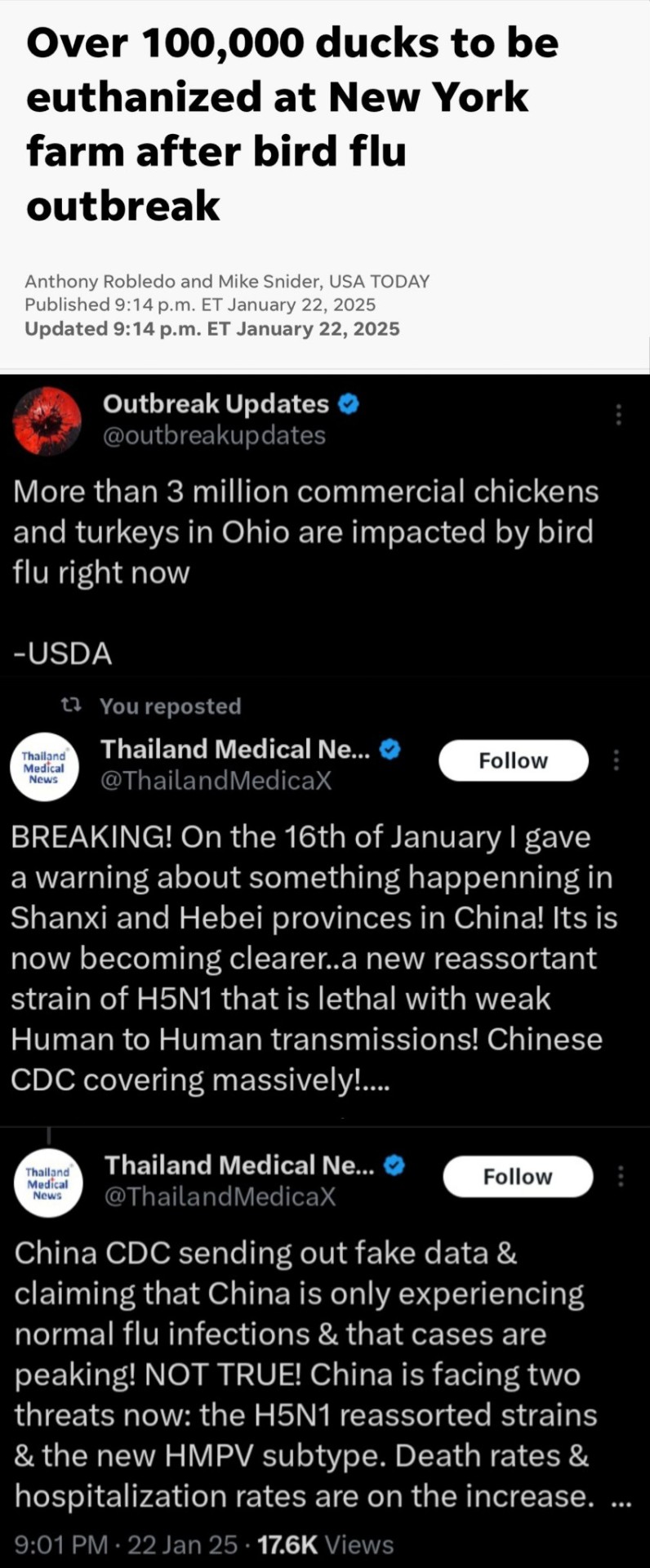
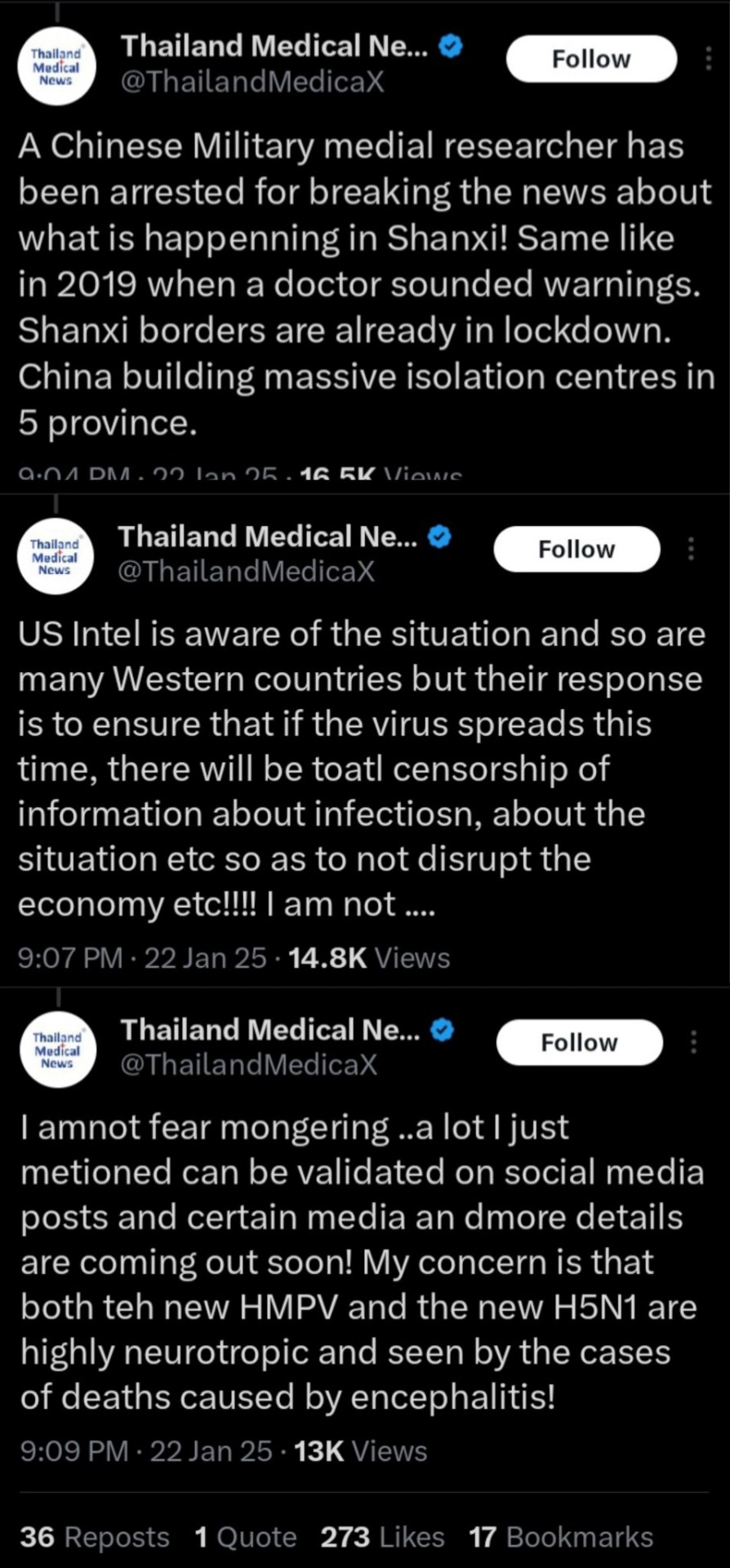
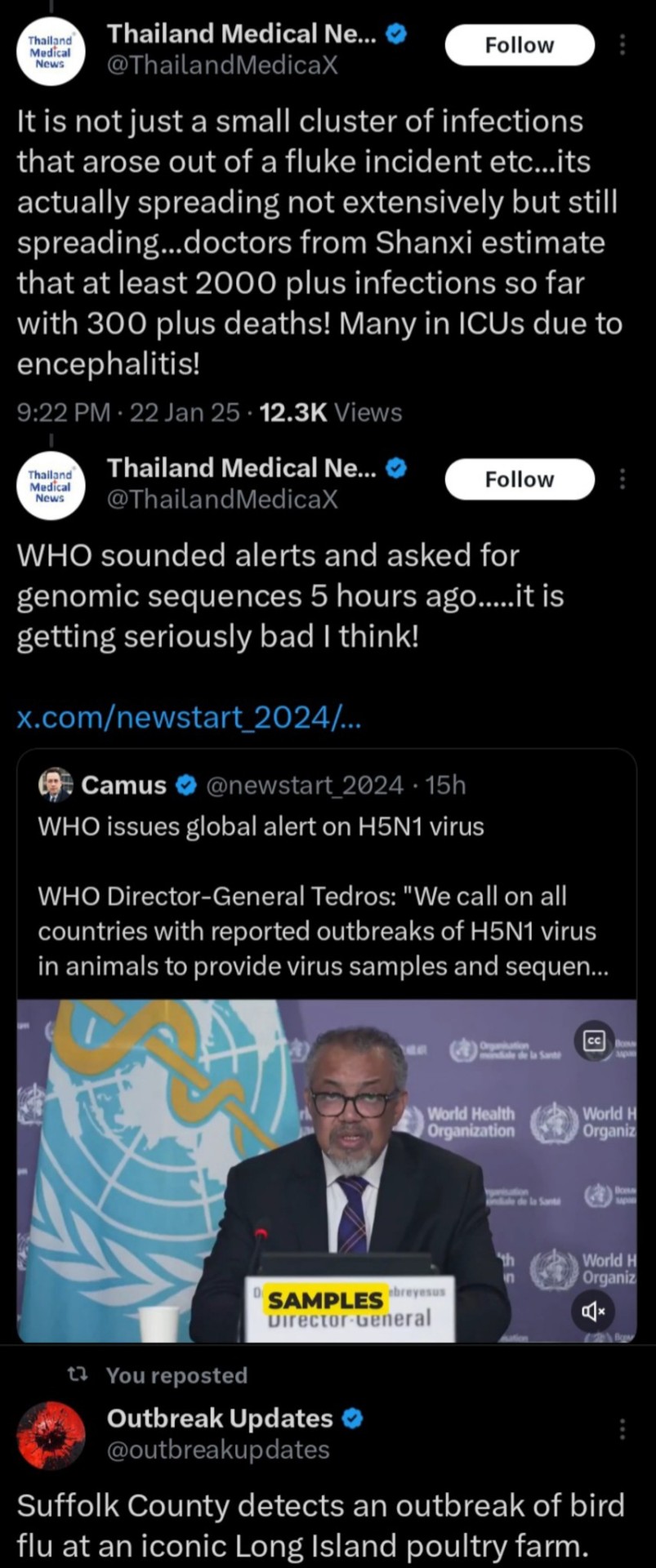
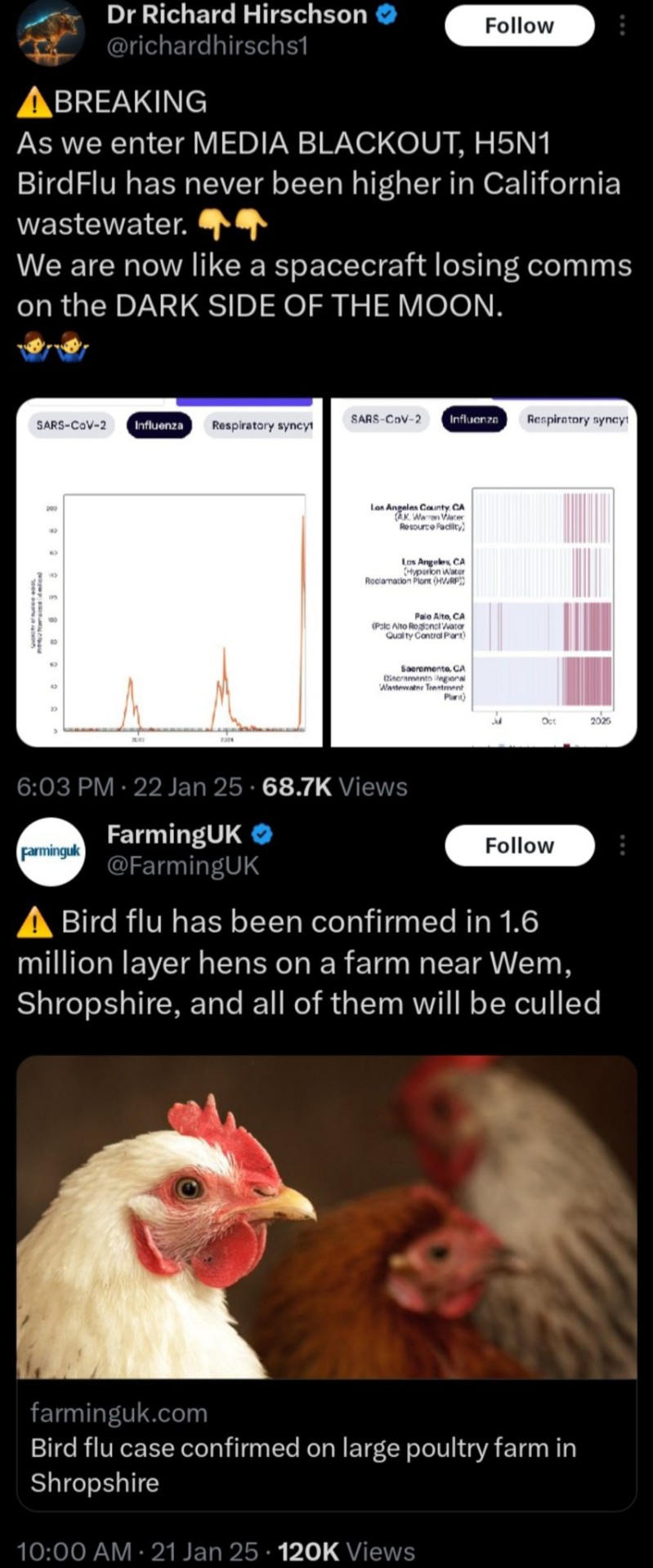
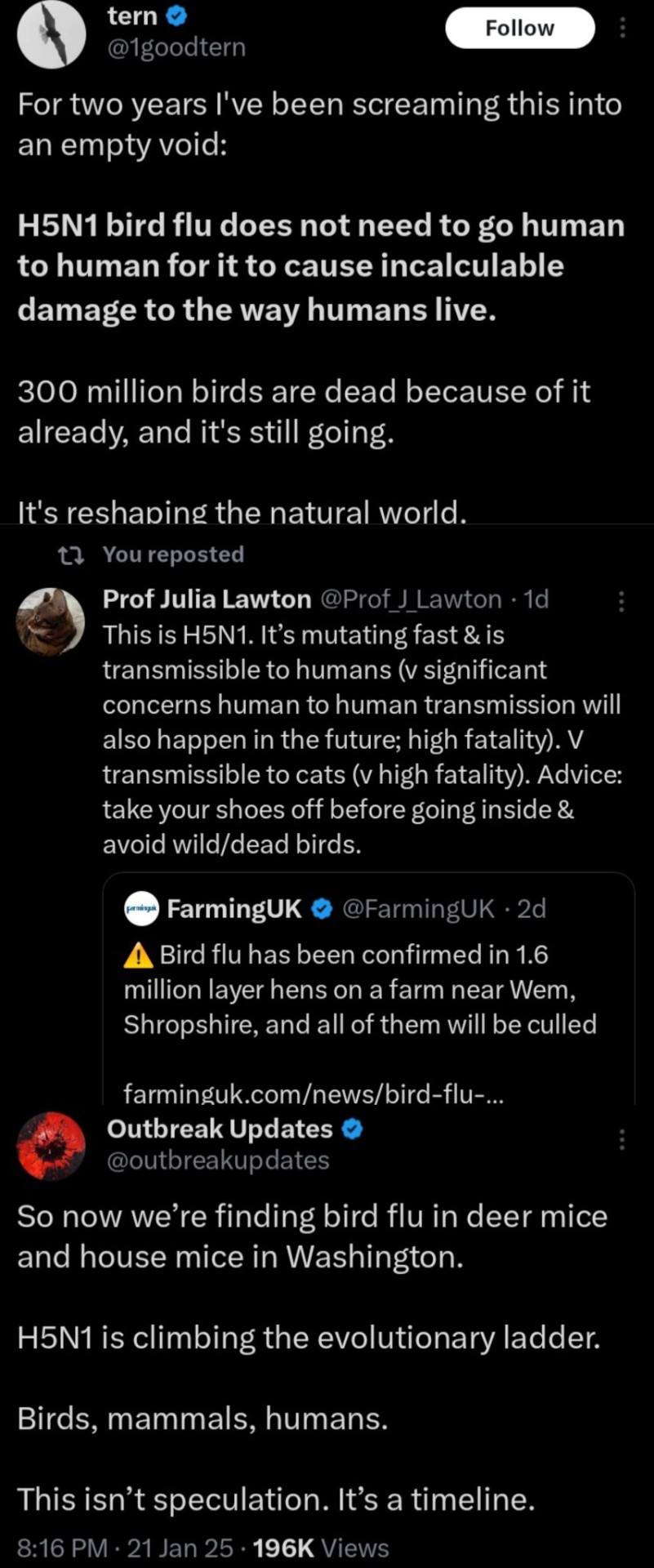
This is a CDC report from 2 weeks ago:
"As of January 6, 2025, there have been 66 confirmed human cases of H5N1 bird flu in the United States since 2024 and 67 since 2022. This is the first person in the United States who has died as a result of an H5 infection. Outside the United States, more than 950 cases of H5N1 bird flu have been reported to the World Health Organization; about half of those have resulted in death."
As of right now, I would highly implore everyone to cease the consumption of eggs and poultry products for the time being. There is currently an egg shortage due to "quality standards" in the U.S. and prices have already gone up dramatically. Get involved in community gardens and get in contact with local farmers--see what you can get directly from there! Mask up, update your vaccinations, practice proper hygiene, avoid physical contact with wild animals (birds especially), and stay safe! Look after your neighbors!
UPDATE: Weekend of 1/24 - 1/26/2025
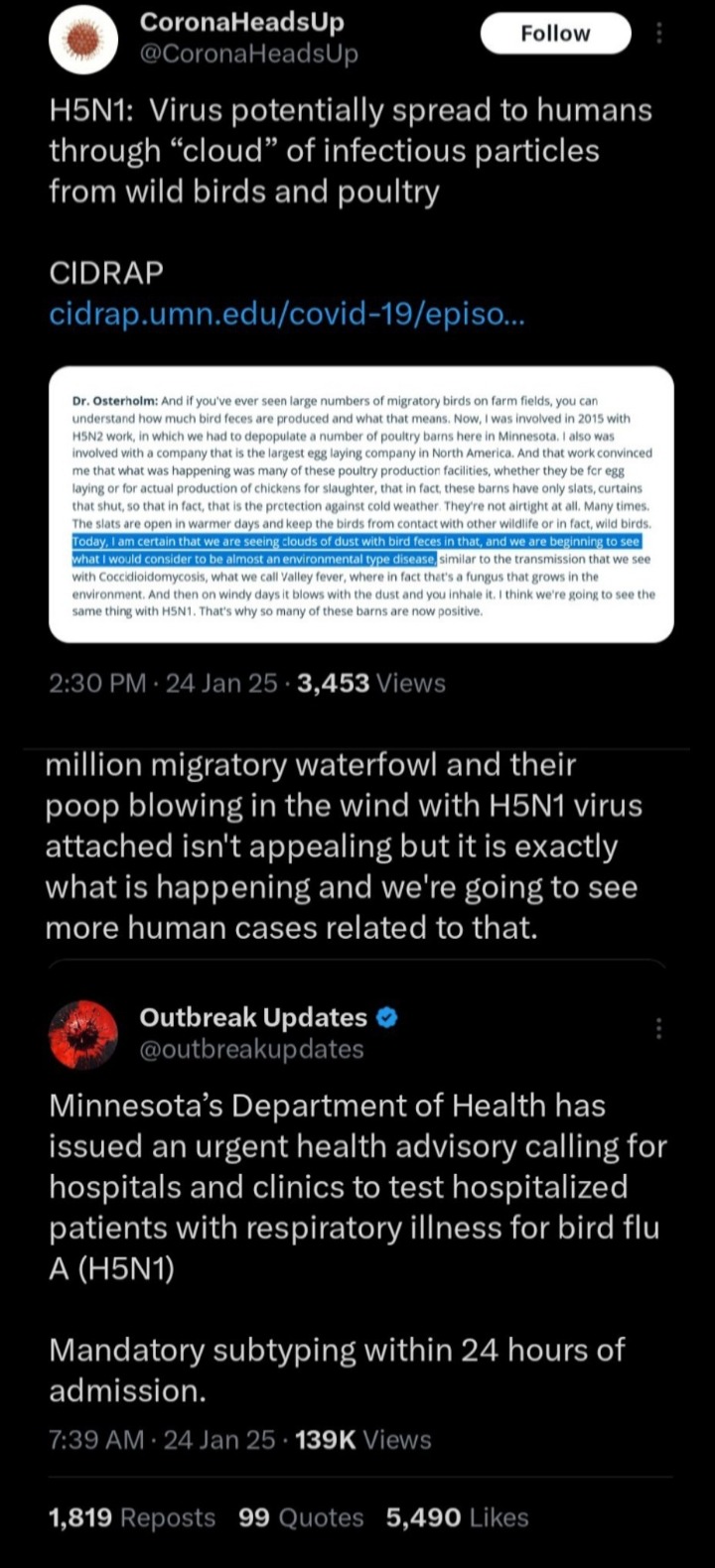
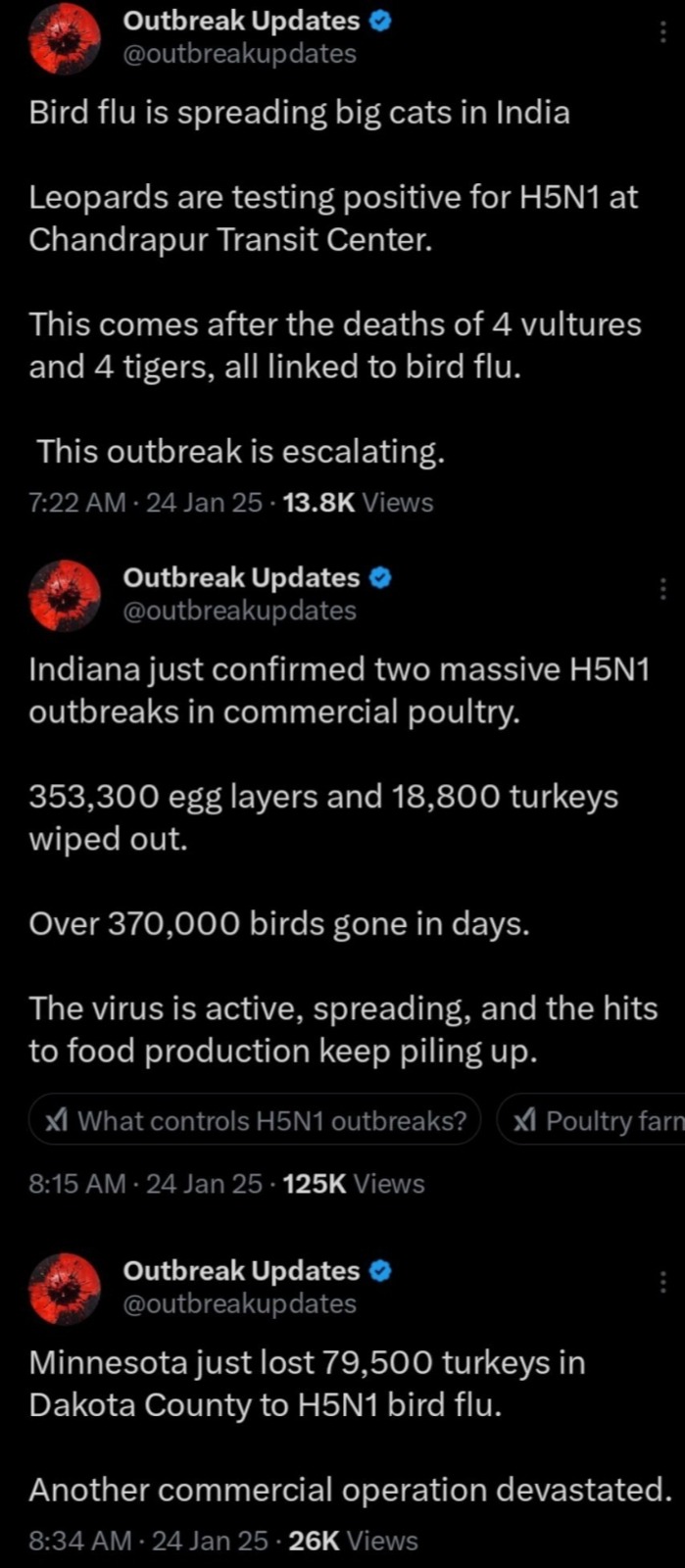
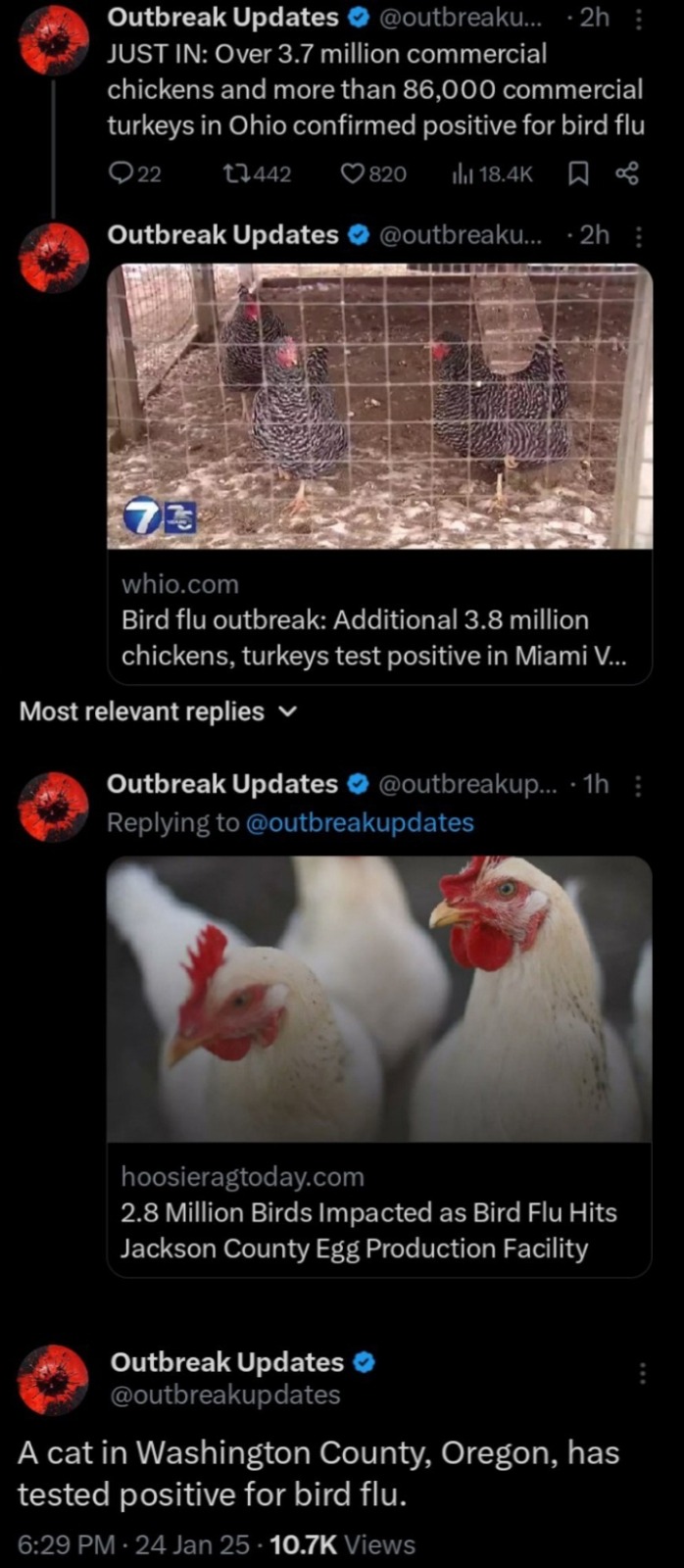
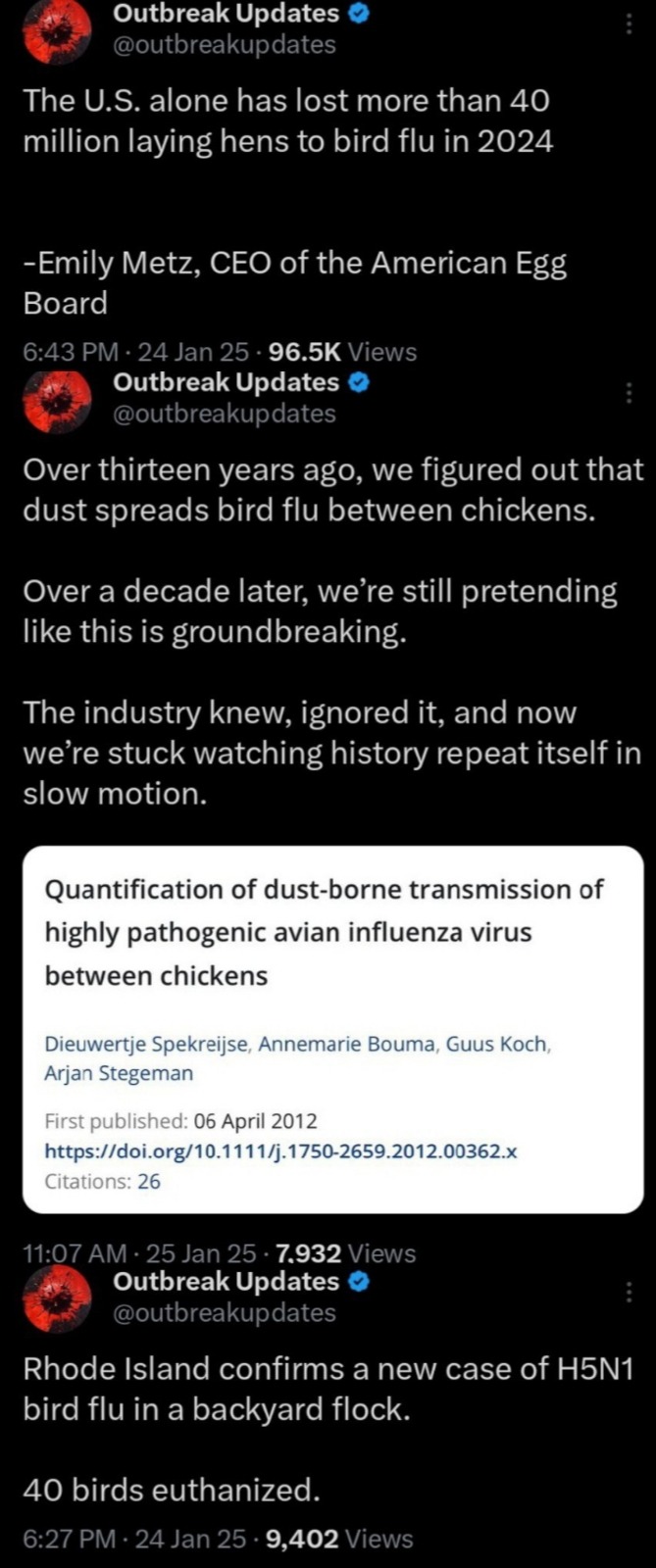
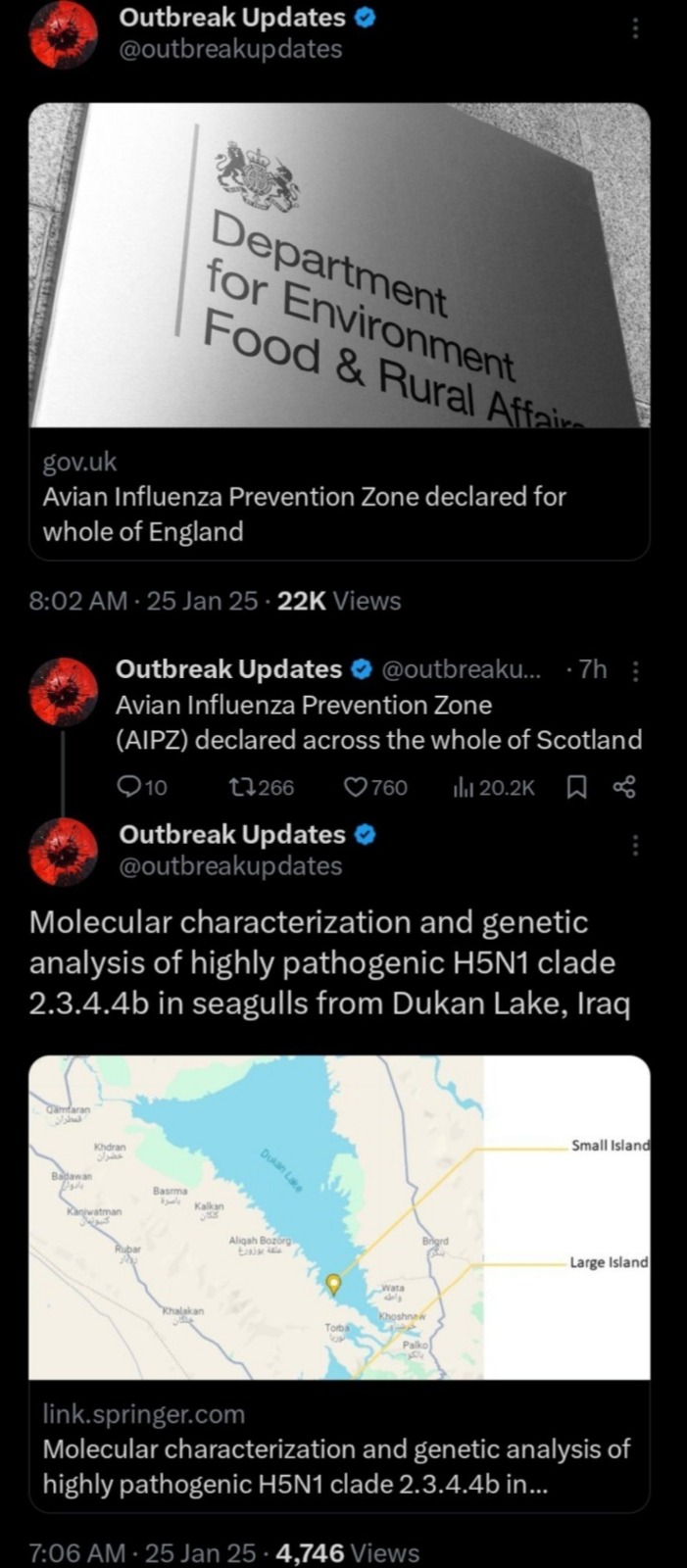
Related: As of 1/26/25
- Kansas, USA is experiencing its highest record cases of tuberculosis in its entire history!
- New case of Polio recorded in Afghanistan
- India saw its first death in 101 confirmed cases of Guillain-Barré Syndrome (16 people are on ventilators)
A warmer planet is only going to exacerbate the spread of diseases worldwide moving forward. Mask up!
#under the trump administration we don't stand a chance i fear#h5n1#bird flu#h5n1 bird flu#h5n1 virus#donald trump#us politics#pandemic#virus#covid 19#covid#cdc#us fda
849 notes
·
View notes
Text
Vaccination In Kothrud | Suryaprabha Nursing Home
If you're looking for a proper immunisation and vaccination in Kothrud, go to Suryaprabha Nursing Home.
#VaccinationInKothrud#pediatricianinkothrud#bestpediatricianinkothrud#vaccine#covid#coronavirus#vaccination#health#pandemic#corona#lockdown#trump#vaccines#news#pfizer#medicine#virus#science#india#freedom#healthcare#memes#covidvacccine#moderna#billgates#truth#staysafe#covidvaccine#wakeup#mask
1 note
·
View note
Text
booster dose | booster dose in india | Covid 19 Vaccine | Covid 19 | healthy | who | Corona cases | coronavirus covid 19 india
WHO said this big thing about booster dose, know what is the opinion of the expert? Booster Dose: Corona cases are continuously increasing in the country. In such a situation, there is a continuous debate about booster doses. In such a situation, do you know from experts whether you can take a booster dose again and again? Image Source: WHO who_booster_dose Corona cases are continuously…
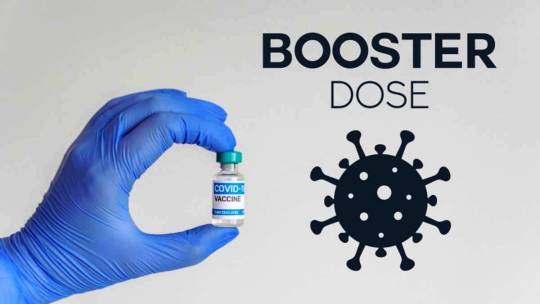
View On WordPress
#booster dose#booster dose in india#Corona cases#coronavirus covid 19 india#covid 19#Covid 19 Vaccine#healthy#who
0 notes
Text
Nasal COVID-19 vaccine halts transmission - Published July 31, 2024
Study in hamsters indicates vaccines targeting nose, mouth may be key to controlling spread of respiratory infections
A nasal COVID-19 vaccine blocks transmission of the virus, according to an animal study by researchers at Washington University School of Medicine in St. Louis. The findings suggest that vaccines delivered directly to the nose or mouth could play a critical role in containing the spread of respiratory infections.
The lightning-fast development of COVID-19 vaccines just months after the virus appeared was a triumph of modern science and saved millions of lives. But for all the good they did in reducing illnesses and deaths, the shots were unable to end the pandemic because of one notable weakness: They couldn’t stop the spread of the virus.
A new study by researchers at Washington University School of Medicine in St. Louis indicates that next-generation vaccines that target the virus’s points of entry — the nose and mouth — may be able to do what traditional shots cannot: contain the spread of respiratory infections and prevent transmission. Using a nasal COVID-19 vaccine based on Washington University technology, approved for use in India and licensed to Ocugen for further development in the U.S., the researchers showed that vaccinated hamsters that developed infections did not pass the virus on to others, breaking the cycle of transmission. In contrast, an approved COVID-19 vaccine that is injected failed to prevent the spread of the virus.
The findings, published July 31 in Science Advances, provide further evidence that so-called mucosal vaccines sprayed into the nose or dropped into the mouth may be the key to controlling respiratory infections such as influenza and COVID-19 that continue to circulate and cause significant illness and death.
“To prevent transmission, you need to keep the amount of virus in the upper airways low,” said senior author Jacco Boon, PhD, a professor of medicine, of molecular microbiology and of pathology & immunology. “The less virus that is there to begin with, the less likely you are to infect someone else if you cough or sneeze or even just breathe on them. This study shows that mucosal vaccines are superior to injected vaccines in terms of limiting viral replication in the upper airways and preventing spread to the next individual. In an epidemic or pandemic situation, this is the kind of vaccine you’re going to want.”
Developing vaccines that can control virus levels in the nose has proven challenging. Viruses such as influenza virus, SARS-CoV-2 (the virus that causes COVID-19) and respiratory syncytial virus (RSV) multiply rapidly in the nose and spread from person to person within a few days of initial exposure. Traditional injectable vaccines generate immune responses that can take a week to build to full strength and are much less potent in the nose than in the bloodstream, leaving the nose relatively unprotected against a fast-multiplying, fast-spreading virus.
In principle, a vaccine sprayed or dropped directly into the nose or mouth could limit viral reproduction and thereby reduce transmission by eliciting an immune response right where it’s needed most. But gathering evidence that mucosal vaccines actually do reduce transmission has proven tricky. Animal models of transmission are not well-established, and tracking person-to-person transmission is fiendishly complicated, given the number and variety of encounters a typical person has on any given day.
For this study, Boon and colleagues developed and validated a model for community transmission using hamsters and then used it to assess the effect of mucosal vaccination on the spread of SARS-CoV-2. (Unlike mice, hamsters are naturally susceptible to infection with SARS-CoV-2, making them the ideal laboratory animals for a transmission study.)
The researchers immunized groups of hamsters with laboratory versions of approved COVID-19 vaccines: the nasal iNCOVACC used in India or the injected Pfizer vaccine. For comparison, some hamsters were not immunized. After giving the vaccinated hamsters a few weeks for their immune responses to fully mature, the researchers infected other hamsters with SARS-CoV-2 and then placed the immunized hamsters with the infected hamsters for eight hours. This first step of the experiment mimics the experience of vaccinated people who are exposed to a person with COVID-19.
After spending eight hours rubbing shoulders with infected hamsters, most of the vaccinated animals became infected. Virus was found in the noses and lungs of 12 of 14 (86%) hamsters that had received the nasal vaccine, and 15 of 16 (94%) hamsters that had received the injected vaccine. Importantly, while most animals in both groups were infected, they weren’t infected to the same degree. Hamsters that had been nasally immunized had virus levels in the airways 100 to 100,000 times lower than those that had received the shot or had not been vaccinated. The study did not assess the animals’ health, but previous studies have shown that both vaccines reduce the likelihood of severe illness and death from COVID-19.
The second step of the experiment yielded even more striking results. The researchers took vaccinated hamsters that subsequently developed infections and placed them with healthy vaccinated and unvaccinated hamsters for eight hours to model transmission of virus from a vaccinated person to others.
None of the hamsters that were exposed to nasally vaccinated hamsters became infected, regardless of whether the recipient hamster had been vaccinated or not. In contrast, roughly half of the hamsters that were exposed to hamsters vaccinated by injection became infected — again, regardless of the recipient’s immunization status. In other words, vaccination through the nose — but not by injection — broke the cycle of transmission.
These data, Boon said, could be important as the world prepares for the possibility that avian influenza, currently causing an outbreak in dairy cows, might adapt to humans and trigger a flu epidemic. An injectable vaccine for avian influenza already exists, and a team of researchers at Washington University is working toward a nasal vaccine for avian influenza. That team includes Boon and co-author Michael S. Diamond, MD, PhD, the Herbert S. Gasser Professor of Medicine and one of the inventors of the nasal vaccine technology used in this paper.
“Mucosal vaccines are the future of vaccines for respiratory infections,” Boon said. “Historically, developing such vaccines has been challenging. There’s still so much we don’t know about the kind of immune response we need and how to elicit it. I think we’re going to see a lot of very exciting research in the next few years that could lead to big improvements in vaccines for respiratory infections.”
Study linked in the first link!
#covid#mask up#pandemic#covid 19#coronavirus#wear a mask#sars cov 2#still coviding#public health#wear a respirator
221 notes
·
View notes
Text
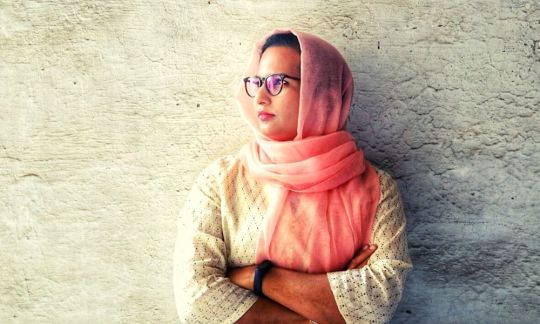
Aqsa Shaikh
Gender: Transgender woman
Sexuality: Queer
DOB: Born 1983
Ethnicity: Indian
Occupation: Doctor, professor, activist
Note 1: In 2021, she became the first trans woman to head a COVID-19 vaccination centre in India
Note 2: Is Muslim
#Aqsa Shaikh#transfemme#trans femme#lgbt muslims#lgbt#lgbtq#queerness#lgbt people#bipoc#transgender#trans woman#queer#1983#indian#asian#poc#doctor#teacher#actvist#first#muslim
92 notes
·
View notes
Text
revisiting the second wave of covid 19 in india reminded me how much I hate the usa those bitches were hoarding vaccines and patenting them while in india we had bodies floating down rivers, lack of oxygen tanks, not enough hospital beds. our government only didn't care because why would modi of all people give a fuck but I love how the united shithole of america manages to make everything worse. I don't think I'll ever be able to convey the totality of the death toll. so many of us were dying left right and centre. my own grandfather almost died in a crowded hospital, which was one of many that were running short of oxygen tanks yankees had enough vaccines to give to their citizens twice over but we're the sensitive ones girl fuck you and your america
94 notes
·
View notes
